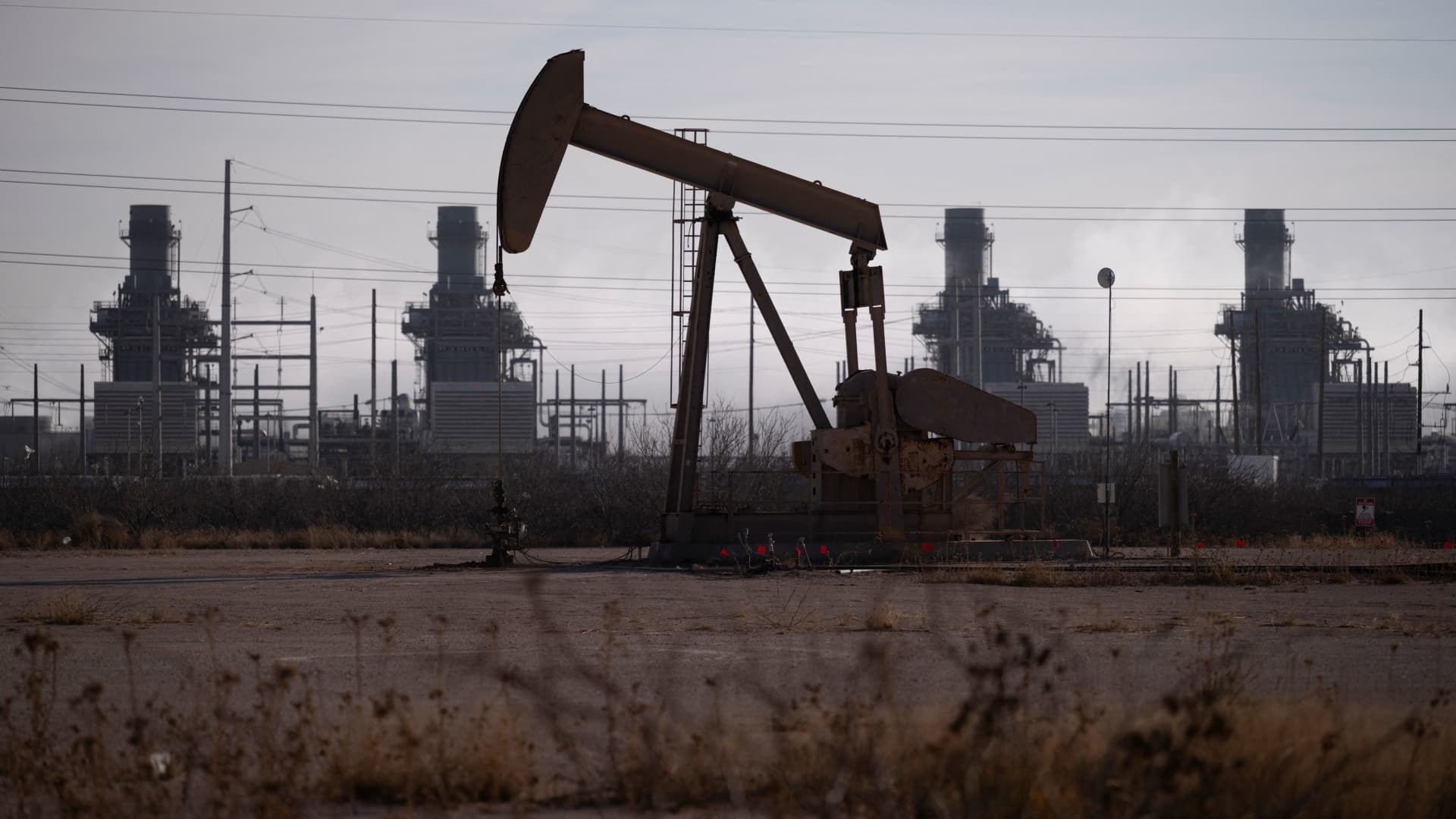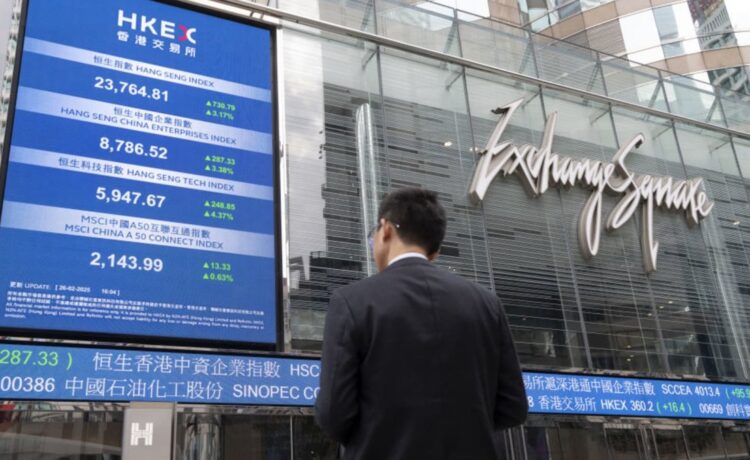This is CNBC’s live blog covering Asia-Pacific markets.
Asia-Pacific markets rose Tuesday, rebounding from previous session’s losses over U.S. President Donald Trump’s tariff policy and threats of even higher levies against China.
Australia’s S&P/ASX 200 added 2.27% to close at 7,510.
Japan’s Nikkei 225 rose 6.03% to close at 33,012.58, while the Topix gained 6.26% to end the trading day at 2,432.02. South Korea’s Kospi rose 0.26% to close at 2,334.23 and the small-cap Kosdaq added 1.1% to close at 658.45.
Hong Kong’s Hang Seng Index climbed over 1.51% to close at 20,127.68, while the Hang Seng Tech Index jumped 4.49%. Hong Kong’s stock market led losses in the region on Monday, with the Hang Seng Index plummeting over 13% to log its steepest one-day decline since 1997, data from FactSet showed.
Mainland China’s CSI 300 rose 1.71% to close at 3,650.76.
Trump on Monday threatened additional 50% tariffs on China if Beijing did not lift its duties on U.S. imports.
Indonesia’s Jakarta Composite slid over 7.87% after trading resumed following a temporary circuit breaker.
Vietnam’s benchmark index lost 6.48% after coming back from a holiday. Thailand’s benchmark SET fell to its lowest level since March 2020, data from LSEG showed.
Trump stuck to his aggressive global tariffs strategy over the weekend, with an initial unilateral 10% tariff going into effect Saturday. Wall Street had been hoping for signs of progress in negotiations between the U.S. and other countries, with the ‘reciprocal’ tariffs set to begin on April 9.
“Asian equities suffered their worst rout in years, plunging to multi-year lows in a day marked by panic and uncertainty,” said Murthy Grandhi, company profiles analyst at data and analytics firm GlobalData.
“The renewed trade war fears have reignited concerns of a global economic slowdown, shattering already fragile investor confidence,” he said, adding that the path forward hinges on policy clarity and diplomatic engagement.
U.S. stock futures rose after the S&P 500 extended its losses for a third day following Trump’s tariffs announcement. Futures tied to the S&P 500 were about 1% higher, while Nasdaq-100 futures gained 1.1%. Futures linked to the Dow Jones Industrial Average jumped 476 points, or 1.2%.
Overnight in the U.S., the three major averages closed lower. The Dow Jones Industrial Average fell for a third day following President Donald Trump’s tariff rollout, dropping 0.91% to close at 37,965.60. The Nasdaq Composite inched higher by 0.10% to settle at 15,603.26. The S&P 500 shed 0.23% to end at 5,062.25.
— CNBC’s John Melloy, Hakyung Kim and Tanaya Macheel contributed to this report.
Singapore prime minister warns of ‘disastrous’ consequences if trade disputes worsen
Singapore Prime Minister Lawrence Wong on Tuesday warned of “disastrous” consequences for the world if trade disputes escalated. He was speaking at a parliamentary meeting.
“The U.S. may have decided to turn protectionist, but the rest of the world does not have to follow the same path,” he said in a video posted by domestic media outlets. “We will forge closer links with likeminded partners who share our commitment to open and free trade.”
Singapore has a free trade agreement with the U.S., and imposes zero tariffs on U.S. goods, and runs a trade deficit with America. However, with the latest U.S. levies, Singapore goods will be subjected to 10% tariffs.
Wong expressed his disappointment with the U.S. move, citing the “deep and longstanding friendship” between the two countries.
The Straits Times Index was trading 1.7% lower on Tuesday.
— Christine Low
China’s yuan depreciates to weakest level since late 2023
The onshore Chinese yuan depreciated to trade at 7.3363 against the greenback on Tuesday, marking the lowest level since September 2023, data from LSEG showed.
While markets expect the yuan/dollar rate to breach 7.5 amid renewed tariff threats, such views may underestimate the PBOC’s resolve — and ability — to stabilize the currency, said Dan Wang, China Director at Eurasia Group.
— Lee Ying Shan
Markets in Asia oversold, scope for rebound in certain markets has some merit, say market watchers
Markets in Asia were oversold yesterday, said Stanley Tang, senior portfolio manager at Sumitomo Mitsui DS Asset Management. Asian equities are largely in the green after a steep sell-off in the previous session.
However, the rebound may be capped by a wait-and-see approach on the anticipated interest rate cuts by the Fed.
“Global recession is somewhat priced in after market correction in past few days, but we need a more accommodative monetary policy to fuel further rebound of equity market. Without this, rebound could be short lived,” he told CNBC.
The current rebound for some APAC markets like Japan, South Korea, Indonesia, Australia and NZ have some merit, said George Boubouras, managing director at K2 Asset Management.
“The extreme correction over the past week has led to some very compelling valuations for those to start to reallocate,” he said.
It is a different narrative for other APAC markets like China however, noted Boubouras, who maintained an ‘underweight’ rating for Hong Kong and Chinese markets given they have the most to adjust from the proposed tariffs.
“Investors need to get comfortable being uncomfortable with the volatility ahead,” he added.
—Lee Ying Shan
Indonesia stocks decline over 9% after trading resumes following circuit breaker
Indonesia’s benchmark Jakarta Stock Exchange Composite Index fell 9.35%, resuming trading at 9.30am local time after a temporary circuit breaker was triggered.
The Indonesian Stock Exchange announced earlier that trading will be suspended for the rest of the day only if the market falls over 20%.
The Indonesian rupiah fell to a record low to trade at 16,850 against the greenback, data from LSEG showed.
—Lee Ying Shan
China says it will ‘fight to the end’ after Trump threatens 50% additional tariffs
China’s Commerce Ministry said it “resolutely opposes” U.S. President Donald Trump’s threat of escalating tariffs, and vowed to take countermeasures to safeguard its own rights and interests.
The comments came after Trump said he would impose an additional 50% duties on U.S. imports from China Wednesday, if Beijing does not withdraw the 34% tariff it imposed on American products last week.
“The U.S. threat to escalate tariffs on China is a mistake on top of a mistake,” the statement said, according to a CNBC translation. “China will never accept it. If the U.S. insists on its own way, China will fight to the end.”
Read the full story here.
—Anniek Bao
Japan stocks jump to lead gains in Asia after sharp sell-off in previous session
Japan stocks jumped more 6% Tuesday, rebounding from the previous session’s losses after U.S. President Trump said that he had spoken with Japanese Prime Minister Shigeru Ishiba.
The benchmark Nikkei 225 surged 6.14%, while the Topix advanced more than 6.52%.
According to Trump, Japan is also dispatching a team to negotiate on trade, of which U.S. Treasury Secretary Scott Bessent and U.S. Trade Representative Jamieson Greer will be in charge of negotiating with, Reuters reported.
“Japanese equities are already at levels that indicate an economic downturn, but their ability to recover will probably not be as impressive as last summer,” Nomura said in a note.
— Lee Ying Shan
Samsung shares up 3% after Q1 estimated profits beat expectations
Shares of Samsung Electronics were up about 3% in early trading at 54,500 Korean won ($37.08) after the South Korean technology giant said it forecasts better-than-expected profit for the first-quarter.
According to an earnings guidance Tuesday, Samsung estimated its operating income for the first quarter to reach 6.6 trillion Korean won ($4.5 billion), beating estimates by economists polled by Reuters.
The operating profit guidance for the first quarter was down 0.2% from the same period last year. Meanwhile, first-quarter revenue is expected to have jumped 9.8% to approximately 79 trillion won.
The results come as the company faces threats from the U.S. President Donald Trump’s recently announced tariffs which could affect its semiconductor and smartphone businesses.
— Dylan Butts
Aberdeen watchful of opportunities for ‘bottom fishing’ across Asian equity markets
Aberdeen is keeping an eye on any areas for “bottom fishing” in the Asian equity markets amid increasing uncertainty. Bottom fishing is the practice of investing in financial assets that saw a significant decline in prices, and are often considered to be undervalued.
“We are watchful of opportunities for bottom fishing across Asian equity markets, although we are mindful of the growth exposures in our regional portfolios, and we are thinking through the potential winners and losers from the tariffs and any monetary policy adjustments that might follow,” Aberdeen Investments’ Deputy Head of APAC equities Pruksa Iamthongthong and her team told CNBC.
Looking ahead, Iamthongthong noted that Asian corporates still remain in “good shape” with low debt levels and strong competitive positions.
—Lee Ying Shan
U.S. crude oil losses deepen on recession fears

A pump jack operates near a gas turbine power plant in the Permian Basin oil field outside of Odessa, Texas, U.S. February 18, 2025.
U.S. oil prices fell about 2% on Monday, adding to last week’s steep losses on fears President Donald Trump’s global tariffs would push the U.S., and maybe the world, into a recession.
U.S .crude oil fell $1.29, or 2.08%, to close at $60.70 per barrel, while Brent lost $1.37, or 2.09%, to settle at $64.21. The latest price action comes after U.S. crude and Brent closed down more than 10% last week.
Futures tied to U.S. West Texas intermediate crude hit a session low of $58.95 per barrel, the lowest level since 2021. Global benchmark Brent fell to an intraday low of $62.51.
— Spencer Kimball
Chip stocks can fall 20% if tariffs cause recession, Citi says
If President Donald Trump’s tariffs push the U.S. economy into a recession, chip stocks could have at least another 20% to fall, according to Citi.
“We believe the biggest risk to the semi sector is a recession resulting from tariffs,” Chris Danely, a managing director at the bank, wrote to clients in a recent note. “If the tariffs continue for another month, we believe is it highly likely the supply chain will ‘freeze up’ given uncertainty, drastically lower order rates/inventory, and result in lower guidance across the board – similar to Covid.”
However, like during the Covid pandemic, Danely said investors can expect a “sharp rebound” once supply chains and tariff impacts become more stabilized and formulaic.
— Alex Harring
Trading volume boomed as Trump’s tariffs shook stocks for a third day
Market participants traded about 29 billion shares on Monday, resulting in the highest volume day in at least 18 years, according to FactSet and Nasdaq Trader.
It was a rocky day for stocks, with the S&P 500 briefly touching bear market territory and the Dow Jones Industrial Average seeing a swing of 2,595 points from its low to the high of the session.
Monday’s volume surpassed Friday’s volume of 26.77 billion shares, as well as the 10-day average volume of 16.94 billion shares.
— Gina Francolla, Darla Mercado













